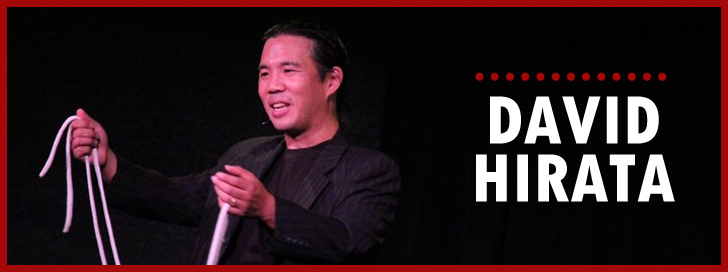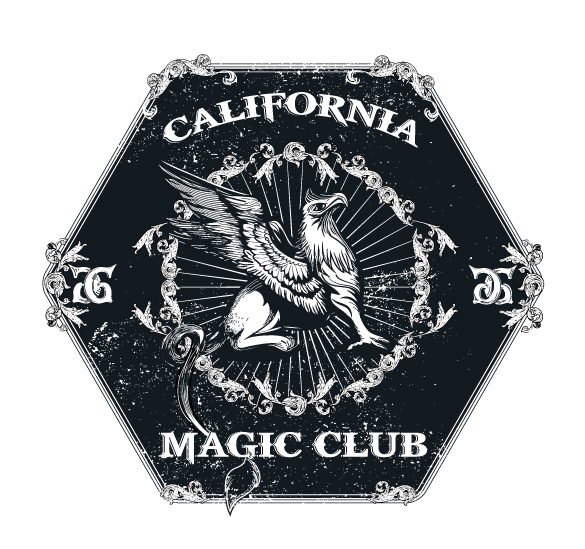Q&A Session with Magician David Hirata

Our club is very excited to present the magic of David Hirata [ thingsimpossible.com ] this Friday and Saturday night. As the first magician to receive a standing ovation in our new club location on Main Street, it was sure time we followed up with him from our last Q&A session. Have a question for David? Post a comment below, and we'll get right back to you!
Who was your biggest influence when you got involved in magic?
I grew up in the ‘70’s, when Doug Henning was the big star of magic. Every kid magician copies his heroes and Henning was a good role model for me—because while I couldn’t copy his modern hippy persona, I loved the way that he performed his magic to be amazing, to “create a sense of wonder,” as he put it.
Tell us a little about the style of your magic show. What part of your show means most to you?
I think there are some faint echoes of Doug Henning in my onstage character, someone who is basically saying, “Look, I’m going to show you some amazing things, and we’ll all have a wonderful time together.” A lot of magicians focus on comedy magic—a natural choice, since a lot of magic is inherently funny. While I tap into that natural humor in magic a lot, first and foremost I’m out to amaze and enchant. In that sense, the part of my show that matters most to me is what happens in the audience’s minds afterwards on the drive home or at the water cooler the next morning. I want that “Wow!” feeling to linger.
What is your favorite memory of California Magic Club since we first opened in 2004?
I love being at Cal Magic, so I’m constantly accumulating new “favorite memories”! Here’s a recent one:
A few weeks ago, Cal Magic’s onstage headliner was Bobby Vegas (the alter ego of our own Robert Kane). During his set, Bobby ran into a problem that could have utterly ruined part of his act. But he instantly improvised a bold workaround on the spot, and, from the audience, the act looked exactly like it should have—to me, it all looked like “business as usual”. After the show, when Bobby told me what had happened, I felt tremendous awe and respect for his showmanship and professionalism in that almost disastrous moment. Getting to be a part of moments like that is one reason it’s such a privilege to be at Cal Magic.
What is the biggest challenge in developing a stage show?
Creating the experience of Magic for the audience (as opposed to mere “tricks”) is a challenge because all of the secret manipulations, machinations, and contrivances have to be completely invisible to the audience. Doug Henning used to say that, in practicing sleight of hand, “the hard must become habit, the habit must become easy, and the easy must become beautiful”. To create a good magic show, every single moment of deception must live up to that standard.
To put it another way, Gerry sometimes compares the performance of magic to a swimming duck; i.e., looking at it from the surface, you see a bird gliding gracefully across the water. But under the surface: little webbed feet, kicking like mad.
Tell us about the first magic trick you learned to perform.
At the risk of sounding pretentious, I think that one can “perform” and one can “Perform”. When I learn the secret to a magic trick and master it well enough to fool an audience, I can certainly “perform” it and have fun with it. But after I have “performed” a piece of magic many times before audiences, I can deeply understand the piece—all the differences that a one second change of timing or a half centimeter shift in finger position can make. That’s when I’ve learned to “Perform” the piece.
So the first magic I learned to perform was the old “severed” finger in a box trick, which I learned from an oddball magic book in my school library(!) called Spooky Tricks (What can I say—I was a 7-year-old who liked monster movies).
The first magic I learned to Perform was probably the linking rings. It took me about 20 years of performing it to learn to perform it. And I’m still learning.
What do you think will change about the art of magic throughout the next five years?
I think that a good magician will always be entertaining and amazing to an audience. But obviously, technology is changing everything, including magic. In the world of high tech, we can see how hundreds of people are creating new “apps” for smart devices. It’s not like twenty years ago, when most computer software came from just a few companies. There’s a lot of creativity to be found in the iTunes marketplace for instance, and it’s not just from big music stars and entertainment companies. So technology has made it possible for many, many new ideas in magic to be created and distributed on a level never seen before.
What’s your favorite quote and why?
From the great filmmaker Federico Fellini: “Life is a combination of magic and pasta.” Aside from the fact that I love performing magic and a good plate of spaghetti, I like this offbeat way that he said, “lighten up a little…and don’t forget ordinary pleasures”.
